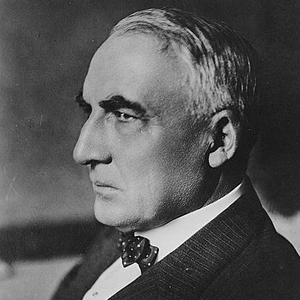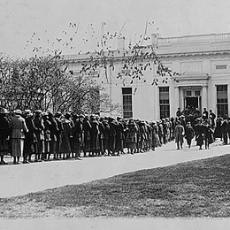STEVE EMBER: Welcome to THE MAKING OF A NATION -- American history in VOA Special English.

This week in our series, Doug Johnson and Shirley Griffith discuss the presidential election of 1920 and the man who won, Warren Harding.
DOUG JOHNSON: The presidential election of 1920 was a turning point in American politics. It ended a period of social reforms at home and an active foreign policy. It began a period of conservative thinking in both the political and social life of the nation.
American reporter H. L. Mencken described the national feeling this way: "The majority of Americans are tired of idealism. They want capitalism -- openly and without apology."
SHIRLEY GRIFFITH: President Woodrow Wilson had suffered a stroke during his second term. He was very sick. No one expected him to be a candidate again. Yet he refused to announce that he would not run for a third term.
Woodrow Wilson had done much during his administration. He helped pass important laws dealing with trade, banking, and the rights of workers. He led the nation through the bloody world war in Europe. He tried, but failed, to have the United States join the new international organization -- the League of Nations.
The American people honored Wilson for his intelligence and ideas. But they were tired of his policies of social change. And they did not want to be involved in international problems anymore.
DOUG JOHNSON: The leaders of President Wilson's Democratic Party understood the feelings of the people. They knew they had little chance of winning the presidential election if they nominated a candidate of change.
Delegates to the democratic nominating convention voted 44 times before agreeing on a candidate. They chose the governor of the state of Ohio, James Cox.
The Republican Party also had a difficult time at its nominating convention. Four men wanted to be president. The delegates voted six times. None of the men gained enough support. So, several party leaders met in private. They agreed that only one man -- a compromise candidate -- could win the support of the convention. He was a senator from the state of Ohio, Warren Harding.
The delegates voted ten more times before choosing Harding as their candidate for president. For vice president, they chose Calvin Coolidge of Massachusetts.
Warren Harding had owned a newspaper in Ohio. People advised him to enter politics, because he was such a good public speaker.

During the campaign, he promised lower taxes, less immigration, and more aid to farmers. He called for "normalcy" -- a new period of peace and quiet, with few changes. That is what the voters wanted to hear in 1920. Warren Harding won the election with 68 percent of the popular vote.
In his first act as president, he invited people to visit the White House. He permitted them to walk in the garden. The act was a sign. The government seemed to be returning to the people.
DOUG JOHNSON: Warren Harding is remembered mostly for two events. One was a successful international conference. The other was a shameful national incident.
After World War One, Britain, Japan, and the United States expanded their navies. They built bigger and better ships. Many members of the United States Congress worried about the cost. They also worried about increased political tension in Asia. They asked President Harding to organize a conference to discuss these issues.
SHIRLEY GRIFFITH: The conference was held in Washington in November, 1921. President Harding invited representatives from the major naval powers of the time: Britain, Japan, France, and Italy. He also invited representatives from countries with interests in Asia: China, Portugal, Belgium and the Netherlands. He did not invite the new Soviet leaders in Russia.
Mr. Harding's Secretary of State, Charles Evans Hughes, spoke. He offered the conference a detailed plan to reduce the size of the world's major navies.
He proposed that the world's strongest nations should stop building warships for ten years. He also proposed that Britain, Japan, and the United States should destroy some ships to make their navies smaller immediately.
DOUG JOHNSON: Delegates to the conference debated the plan for three months. Japan demanded, and won, the right to have more ships. But the final agreement was very close to the one proposed by Secretary Hughes.
The conference was not a complete success.
For example, it did not prevent countries from building some kinds of ships. These ships would prove important in the second world war. Also, it did not create ways to protect China and the islands in the South Pacific Ocean from Japanese expansion. Yet the naval treaty of 1921 was the first in which the world's strongest countries agreed to reduce the size of their armed forces. Most people thought it was a good treaty.
SHIRLEY GRIFFITH: The second thing for which President Harding is remembered is the Teapot Dome scandal. It involved the misuse of underground oil owned by the federal government.
Warren Harding was an honest man. But he did not have a strong mind of his own. He was easily influenced. And he often accepted bad advice. He explained the problem with these words:
"I listen to one side, and they seem right. Then I listen to the other side, and they seem just as right. I know that somewhere there is a man who knows the truth. But I do not know where to find him."
DOUG JOHNSON: President Harding appointed several men of great ability to his cabinet. They included Secretary of State Charles Evans Hughes, Treasury Secretary Andrew Mellon, and Commerce Secretary Herbert Hoover. However, some of his appointments were dishonest men. One was Interior Secretary Albert Fall. He was responsible for the Teapot Dome scandal.
Secretary Fall gave a private company the right to take oil from land owned by the federal government. In return, the company gave him money and cattle.
The oil was not supposed to be taken from the ground. It was supposed to be saved for the United States navy to use in an emergency. Private oil companies and many politicians opposed this policy. They said saving the oil was unnecessary.
SHIRLEY GRIFFITH: Albert Fall opposed the policy when he was a member of the Senate. When he became Interior Secretary, his department took control of the lands containing the underground oil. Then he permitted private companies to use the land for a period of time. During that time, the companies could take out the oil.
Some of the oil was in the western state of Wyoming. The rock mass on the surface looked like a container for making tea. So, the area was called Teapot Dome. When the Senate uncovered Secretary Fall's wrong-doing, the press quickly called the incident the Teapot Dome scandal.
The Senate investigation led to several court cases which lasted throughout the 1920s. Secretary Fall was found guilty of misusing his government position. He was sentenced to prison for one year.
DOUG JOHNSON: President Harding did not live to see the end of the Teapot Dome incident. In the summer of 1923, he made a political trip to Alaska and western states. On the way home, he became sick while in San Francisco. He died of a heart attack.
Vice President Calvin Coolidge was in the northeastern state of Vermont when he heard that President Harding had died. Coolidge's father was a local court official there. He gave the oath of office to his son. That is how Calvin Coolidge became the 30th president of the United States.
The story of his administration will be the subject of our program next week.
(MUSIC)
STEVE EMBER: Our program was written by David Jarmul. The narrators were Doug Johnson and Shirley Griffith. You can find our series online with transcripts, MP3s, podcasts and historical images at voaspecialenglish.com. You can also follow us on Facebook and Twitter at VOA Learning English. Join us again next week for THE MAKING OF A NATION -- an American history series in VOA Special English.
American history series: the United States turns inward after World War One
American history: Wilson urges support for idea of League of Nations
There weren't always crowds going wild at presidential inaugurals
(來源:VOA 編輯:崔旭燕)
